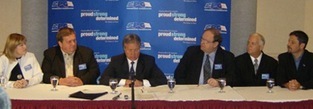1. Kiss Labrador good-bye, Danny. Anger over the energy plan seems to have galvanized attitudes in Labrador. The Labrador party announced on Friday that it won't be fielding candidates in the two ridings currently held by the DW Team. This will almost certainly guarantee the New Democrats will recapture Labrador West.
Meanwhile in the central district currently held by transportation minister John Hickey, it may become a contest to see if Hickey can stand three weeks of sleepless nights. looks like Chris Montague will be taking Hickey's seat; it will be interesting to watch Montague waving his "broken promise" letter from the Premier for the couple of years before DW retires.
Well, either that or Williams will spend the rest of the campaign in Labrador going door to door by dogsled, skidoo, quad and anything else he can use to get every vote possible.
Will there be any other seats where parties will not field a candidate to defeat an incumbent? Stay tuned.
2. The Fuehrer furor. Campaign 101: read the introductory speech of everybody introducing the party leader and anyone else on the speaking program. Stupid comment handled defensively thereby trebling the impact of the first goof.
3. The People's Campaign? From David Cochrane's campaign notes at cbc.ca/nl:
As I write this I'm on a Provincial Airlines Cessna Citation flying to Happy Valley Goose Bay.
 That would be the executive jet - left - used by DW on the first day of the campaign to get to Deer Lake. After you allow for the Premier and a couple of staffers, the rest of the plane is media. The thing only holds eight people.
That would be the executive jet - left - used by DW on the first day of the campaign to get to Deer Lake. After you allow for the Premier and a couple of staffers, the rest of the plane is media. The thing only holds eight people.
Wonder how much it costs? Provincial doesn't disclose its lease rates. In the old days, campaigns would lease larger aircraft and pull everyone around in the same airborne cattle car. The per passenger charge worked out pretty well the same for everyone.
Given that the media - like say the Mother Corp - would be or should be paying their own way on the eight seater, the cost for the Premier and his staffers would be pretty light. The media types would actually be the largest number of passengers. Having news media subsidize the campaign travel budget. Interesting concept.
Bond Papers welcomes e-mails clarifying the travel/cost arrangements.
4. Another committee named after a dead racehorse. Both the Liberals and Conservatives like things called secretariats. The Libs created a rural one before they were punted from office in 2003 and the Tories in office continued that along with a bunch of other Liberal policies.
Now the Liberals are talking about a population growth secretariat. Both parties are missing the point. The issue is one of economic development. It has nothing to do with either insufficient motivation ("Would you do him for a grand?") or the lack of recent MUN graduates traveling around the province holding consultations on copulation rites and rituals and producing reports in the time it takes elephant fetuses to gestate.
So far the rural secretariat hasn't produced any more wins than the race horse has lately. It's dead and so is the idea that make-work projects for bureaucrats solve anything.
5. Another reason Danny should regret voting for Harper: Child care. It's not like some us didn't warn about the choice in child care scam either. Bonus would have been getting the feds to pay for it, versus shelling out of your own pocket.
6. The Dan Vinci Code. Do you see the "w" formed by the three figures at the centre of this  tableau?
tableau?
 And while we're at it, is the similarity to this famous painting just a coincidence?
And while we're at it, is the similarity to this famous painting just a coincidence?




